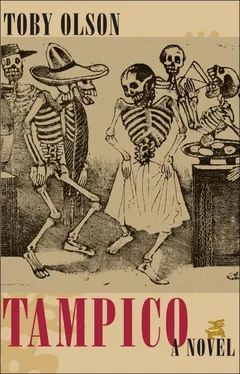Carlos was under the eaves in darkness of shade, and they couldn’t see him, and he stood still and watched them. The man in the straw hat was pointing at the house, his fingers wiggling and gesturing toward the ruined causeway. He held his other hand at the edge of his hat brim, fighting the sinking sun. Then he was pointing toward the rear of the house, then turning toward the smaller man at his side, his hands striking the large sombrero brim as he was forming shapes in the air, and the small man pushed his hat away. It fell down over his shoulders to his back, the cord at his throat, and Carlos could see his face then, the features of someone historical. Then the four men were moving, jostling for position as the road narrowed and became the path, until they were two abreast, the heavy man helping the one in the beaded skullcap with the chair, the two smaller ones in front. They had almost reached the gate when they entered the house shadow and the sun left their eyes. The two paused when they saw him, and the chair banged into the legs of the one who had gestured and he fell back to sit upon the sleeping bags and cooler, swearing through a groan. The one beside him had screwed his sombrero back on his head, and Carlos couldn’t see his face anymore, but he could hear the words as they flew out under the brim. “Christ save us all! It’s the little guy!”
He had never seen them, but he had heard them, and though it had been in delirium, that occasional waking to metallic voices in which dreams were part of coma and sentient awareness indistinguishable from dreams, he’d had a picture of them, in stories and the muffled talk that proceeded from them and was joined to the sounds of motion, the creak of furniture and that shuffling of slippered feet through doorways, all of it like an audio shadow play, heard from behind a screen. And he may have somehow counted them, for he was not surprised that they were four. Harry Truman, he thought, World War II and The Bomb, as he lay in the crease where the veranda joined the railing in his sleeping bag. He could see stars between the worn, wooden uprights, and the air was cool and fresh. He’d given them the house, the bed for John and Larry, the other two on the floor in corners, and he could hear their voices, almost as before, that metal quality no longer part of a dream image, understood now as infirmity, their tracheotomies and the effort and the whistles in their breathing. Larry in his skullcap and linen and trimmed mustache, stylish even in chemotherapy; Frank, heavy and disheveled, that slightly protruding upper lip he’d pictured, receded now, replaced by the jutting of his lower jaw, slightly bulldogish, skin veined and stretched tight at his sinking cheeks, jowls hanging down below his chin. He wondered if anyone would recognize them in youthful photographs. And at this different desert, though it was not really that, but scrub and ground where crops had been traded in for oil near the sea, he thought of T. E. Lawrence: “The living knew themselves just sentient puppets on God’s stage.” It was the way he’d imagined them, the textures of their lives only in their told stories, voices flat like silhouettes behind them. But what he saw in them was faces animated in the present, for they were in a story now and not telling one.
The surveyors left shortly after their arrival. They’d managed to lug the chair up to the veranda, then had wheeled it right through the house and out the back door to the porch. They’d seen the cauldrons in the yard then, and Carlos had seen John grip the metal handle, and once they’d unloaded the chair, he’d settled himself into it, and Larry had covered his knees with one of the blankets. The surveyors eyed them as they packed up their gear, then handed Carlos some sort of document and left.
There was so much to say that there seemed nothing to say, and only after they’d unpacked and negotiated places for themselves and Larry and Frank were carrying buckets from the pump out to the cauldron and filling it and working at a wood fire under it, did Gino turn from his place on the porch steps to watch Carlos remove the deed from his pocket and hand it to John, who sat in the wheelchair looking out at the beginning of the foothills and the oak tree Chepa had planted at the property’s perimeter. A yellow wooden stake stood beyond the trunk, still under the spreading branches, a red plastic ribbon fluttering in the light breeze at its tip. The tree had grown into a massive stateliness over the past sixty-seven years.
“This isn’t it,” John said, holding the deed out at arm’s length to study it. “It was a letter. Corzo had signed it. Chepa too. It had a seal. What’s this name here?”
“Roberto Menéndez,” Carlos said. “The previous owner. The man mentioned an alias, Calaca.”
“You’re shitting me!” John said. A cigarette hung from his lips, bobbing as he spoke. He’d tilted his derbylike hat back, and wisps of grey hair poked out at the crown above his bushy brow. Carlos saw the angry scar, running from eye to chin.
“And you?” Gino said. “For him it was Chepa. How did you get there?”
His wrist rested on his knee, one leg lifted to a higher step. He’d found a thin weed somewhere and it dangled from his mouth, and in his boots and sombrero, he looked like a wiry old Mexican farmhand, but for his face and that Truman brow.
“I don’t know,” Carlos said. “But it was you then? At the records office?”
“Just about three days ago,” John said. “They were no help at all.”
Carlos looked down at him and at the deed. “What about a man named Joaquín Sánchez? Do you know that name?”
Gino had talked them into it, inducing a little guilt and a little promise. They’d been talking about Chepa again, her leaving and her letter, and about Joaquín and John’s days in Tampico. The doctors had brought another group of potential buyers to see the Manor, and they’d stood in a tight cluster in the solarium, speaking about the potential for renovation, ignoring the men who sat in their chairs, smoking, huffing through their tubes, and when they’d left Carolyn had come in with their dinners, and Larry had tried to joke with Gino, yet again, when she had shushed away in her starched A-line and tennis shoes. Kelly was gone now, permanently, and Gino was at the window, looking out across the meadow and up to Kelly’s house. He could see dark places where clapboards had torqued and fallen away, and he thought he saw a slight sagging in the roof. The yellow lights on the barricades were blinking.
“Fuck that,” he said. “Enough with sexual fantasy. It isn’t even that, just a lame joke for the lame.”
“You’re right,” Larry had said. “Just something to do.”
“No,” Gino said, turning to look at the three of them. “It isn’t even that. We’re not doing anything. We’re hardly even living.”
He got them to get their bankbooks and insurance policies. Then he went to his own bedside locker to get his, and when he came back, and they were all gathered again, he produced a number of maps and brochures, various routes to Tampico and places to stay and see there. One of the hotels was the one John had lived in over a half century before. It had changed, renovations and ownership, but he still recognized the façade, and the picture even showed the very window he’d looked down from, and the picture made a promise real, and he was drawn into Gino’s talk as more than talk, and it was not long before Frank and Larry could imagine the place too, beyond those stories of it, as something concrete, really down there in Mexico, a place to go, and maybe be alive in a way different from this inertia in the going. They found they had a good deal of money between them, given negotiables, enough at least, and John thought he might have a house, and the others thought they might share in that for a while, and if not, so what, and the next morning Gino slipped out and went to a travel agent and in the afternoon was back with the tickets and reservations.
Читать дальше












